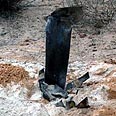
Qassam rocket (Archive photo)
Photo: Ran Yadai
Cleared for publication: The Islamic Jihad and Fatah's al-Aqsa Martyrs' Brigades fired a Qassam rocket at Israel from the West Bank town of Jenin about three weeks ago, Israel's leading newspaper Yedioth Ahronoth reported Sunday.
The attack marked the first time a Qassam fired at Israeli targets from the West Bank and came close to hitting a Jewish community.
The rocket landed in a Palestinian area in proximity to the Israeli community of Ram-On.
About nine months ago, security forces neutralized a Qassam rocket ready for launch in Jenin. Later it turned out the cell behind the rocket already fired two Qassams earlier, but they were far from hitting Israel.
Notably, Qassam rockets found in the West Bank are more primitive than those held by terrorists in the Gaza Strip. While Gaza Qassams have a range of 7.5 kilometers (about 5 miles,) those in the West Bank are estimated to have a range of no more than 5 kilometers (about 3 miles,) and be less potent in terms of explosive power.
'Expected development'
However, despite the Qassam being a relatively primate weapon, there are quite a few Israeli communities in range of West Bank rocket attacks. Residents in those communities expressed their displeasure over the attack and demanded that the government act firmly in response to the strike.
Security officials, meanwhile, said "this is a highly severe development, although expected."
"We will act in all ways in order to prevent this terror infrastructure from developing," one defense official said.
The West Bank Qassam attack has boosted concerns about the production of rockets in the area. In recent months, Palestinian terrorists stepped up their efforts to transfer know-how from Gaza to the West Bank in a bid to produce a weapon that can circumvent the Israeli security fence.
The technology required to produce the rockets is transferred in various ways, namely by phone, through the Internet, and by taking advantage of prisoners released from Israeli jails after learning how to produce the rockets in prison.
Amir Ben David contributed to the report















